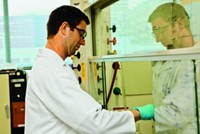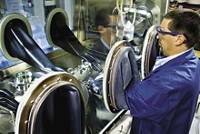Advertisement
Grab your lab coat. Let's get started
Welcome!
Welcome!
Create an account below to get 6 C&EN articles per month, receive newsletters and more - all free.
It seems this is your first time logging in online. Please enter the following information to continue.
As an ACS member you automatically get access to this site. All we need is few more details to create your reading experience.
Not you? Sign in with a different account.
Not you? Sign in with a different account.
ERROR 1
ERROR 1
ERROR 2
ERROR 2
ERROR 2
ERROR 2
ERROR 2
Password and Confirm password must match.
If you have an ACS member number, please enter it here so we can link this account to your membership. (optional)
ERROR 2
ACS values your privacy. By submitting your information, you are gaining access to C&EN and subscribing to our weekly newsletter. We use the information you provide to make your reading experience better, and we will never sell your data to third party members.
Business
Hiring Chemistry
More than ever, biotech companies need good pharmaceutical chemistry partners
by Michael McCoy
October 5, 2009
| A version of this story appeared in
Volume 87, Issue 40

Large pharmaceutical companies hire outside chemistry research firms to supplement internal R&D capabilities and save some money. Small biotechnology firms hire them because they have no choice.
That was one of the takeaways from ChemOutsourcing, a conference and trade show held last month in Long Branch, N.J. The event attracted about 750 attendees from drug companies and chemistry services suppliers for three days of discussion about pharmaceutical chemistry outsourcing.
The panel discussions featured executives from drug companies both big and small. The speakers, most of them Ph.D. chemists, shared their thoughts about how they choose third-party chemistry research suppliers and then continue to manage the relationships for best effect.
The differences between big pharma and biotech firms are evident the moment the hiring process starts. Srinivasan Babu, a senior scientist at the drug giant Genentech who is involved in chemistry outsourcing, said he likes to try out new contract research organizations (CROs) by giving them a small, noncrucial synthesis task and watching how they do.
But Firoz D. Antia, executive director for product development at Palatin Technologies, a New Jersey-based developer of peptides and peptide mimetics, said he doesn't have the resources to farm out test jobs. "We have to vet our CROs carefully before we give them the first project," he said.
The differences continue into the actual outsourcing of drug discovery and development tasks. That's because the goals of cash-rich big pharma firms and struggling biotechs are typically not the same.
The end game for scientists working at a large drugmaker is the launch of a new product that will help patients while also benefiting the firm's bottom line. But the biotech company attendees were frank in acknowledging that their goal is to prove a drug candidate's effectiveness in order to trigger a round of venture capital financing or, even better, to license it to a bigger firm.
"To get to licensing at Phase I or Phase II—that's our launch," said David Fick, director of medicinal chemistry at California's Cenomed BioSciences, referring to clinical-trial phases. Cenomed is developing drugs for nervous system disorders.
Fick and other panelists said the global financial crisis has taken the already arduous process of funding drug development and made it downright precarious. Small companies are taking shortcuts that, although not compromising accuracy or safety, could be creating expensive headaches down the road.
For example, a number of chemistry executives admitted to entering clinical trials with a pharmaceutical molecule made via a medicinal-chemistry-style laboratory synthesis, rather than one made after careful process development in a pilot plant. They do this knowing full well that such a synthesis may not hold up on the production scale necessary for larger trials.
"You will save money," said Remy Angelaud, director of active pharmaceutical ingredient development and manufacture at San Francisco-based Medivation, "but in the long run it can work against you."
Chemistry leaders are also tempted to take shortcuts in their agreements with CROs. Michael G. Williams, director of pharmaceutical R&D at Targacept, a developer of drugs that selectively target neuronal nicotinic receptors, described a tug-of-war between the desire for ironclad contracts and the realities of the clock.
To save time, Williams has purchased necessary raw materials and shipped them to a CRO even before he has drafted a contract with the firm. "I can do that more easily, sometimes, than get a contract out the door," he observed. The speedy approach can backfire, however. Williams described a drug candidate that Targacept's chemists made with a 10-step medicinal chemistry synthesis that had a yield of only 2%.
Needing 1 kg of the compound for a clinical trial, Targacept quickly purchased 80 kg of a key raw material and shipped it to a contract manufacturing partner. In the meantime, however, the chemists improved the yield to 15%. "Now we're sitting on a lot of raw material," he said. "Our focus is to get to that proof-of-concept study—probably Phase IIa—and sometimes we don't worry about what happens after that."
Williams' firm is like its big pharma brethren in one way: It won't sign a chemistry contract that could jeopardize its intellectual property. "We are a small discovery company and are generating a lot of molecules," he said. "We consider IP to be the strength of our company. If we can't own it, we are going to look elsewhere."
But Cenomed's Fick had a different perspective. "In a very small company, sometimes you use IP as money," he acknowledged. "You may be willing to give up some to get stuff done cheaply."
Differences in IP strategy aside, all of the conference participants could agree with Brian S. Bronk, vice president of chemistry at Satori Pharmaceuticals, when he observed that the contracts small drug companies sign with CROs can mean the difference between failure and making it in today's biotech world. "The success of Satori," he said, "relies on the success of the chemistry program."—Michael McCoy





Join the conversation
Contact the reporter
Submit a Letter to the Editor for publication
Engage with us on Twitter